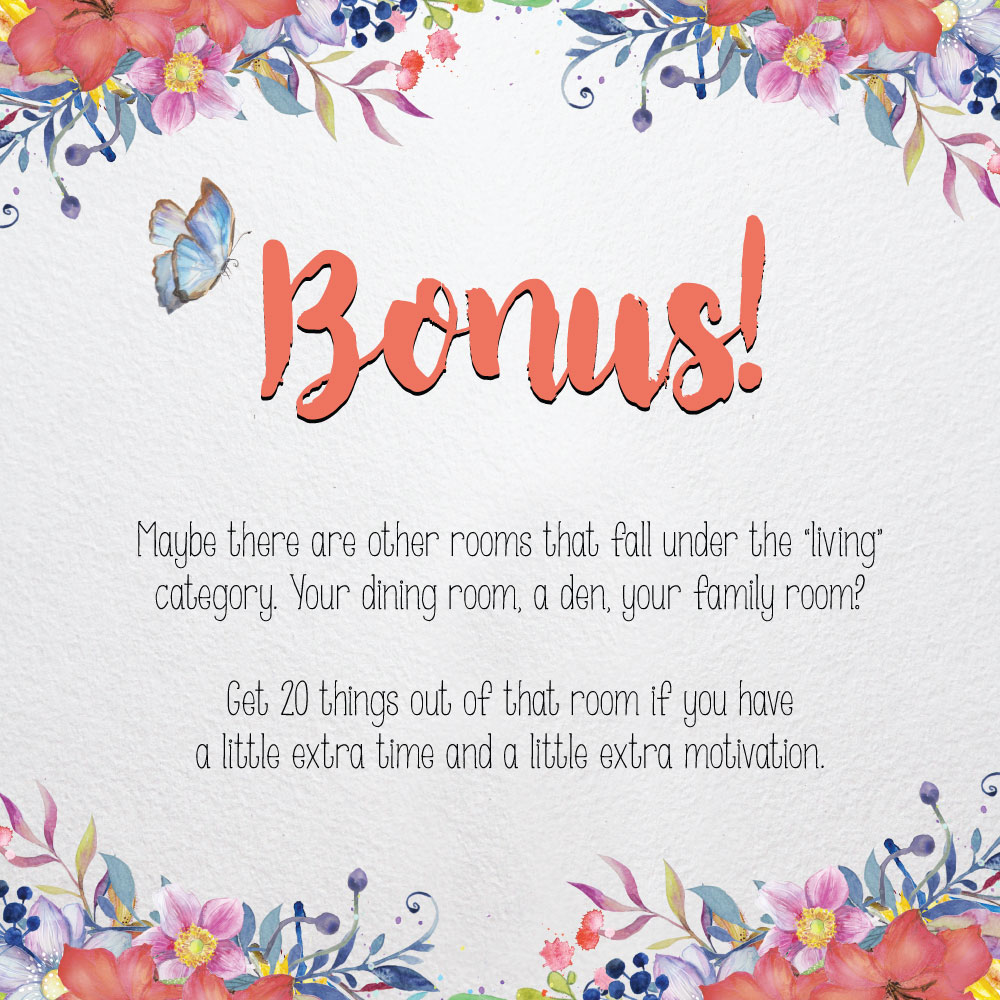
by kathilipp | May 12, 2017 | Clutter Free, Spring Fling |

Day 10 and it’s time to get out of the house … and declutter the garage.
For years, my garage has been the dumping ground for everything. My business, my kids’ stuff, tools, craft projects, out of season clothes, out of season decorations, mid-project projects, suitcases, gardening supplies, games, puzzles, and the bike that never, ever gets ridden.
It Gets Better in your Garage
I’ll be honest with you: my garage is still a huge work in progress. The good news? There IS progress. When I went to go work on my 20 items today, I knew the corner I had to tackle: the “Camping Corner.”

Roger and I love to go day camping, so we keep a lot of supplies. But this corner has been overrun by one too many “dump and runs.” There were out of season clothes, decorations (apparently, I’m obsessed with giant fall pumpkins), wrapping paper, books, and the results of too many Costco runs. We’re good on toilet paper for the rest of our lives.
So, I gave myself an afternoon to go through the corner, get my 20 items, and make sense of all of the stuff.
I was done in 30 minutes.
Why did it take so little time? Because after all my flings in the past, there really wasn’t that much to declutter—it just needed to be put away properly.
I know that as a clutterer, I tend to be overwhelmed by projects and think they’re going to take more time than they actually do. Starting off with only 15 minutes is going to help you break things down and get them into doable chunks. You can do this!
Instructions
– Set up your three boxes/totes and two bags.
– Pick one area to work on. One shelf. One corner. Don’t get overwhelmed. Start sorting and revel in the space that you are reclaiming!
– Set a timer and go for it. 15 minutes usually can do it, but if you need to put another 15 minutes on the timer, go for it.
Bonus
Some bonus things you can do in the basement or garage:
- Label storage areas. Make a big sign so everyone in the family knows where things go.
- Boy, can my garage get dusty. If there are items you care about, dust them or store them in a storage box.
- Speaking of storage boxes, can you get rid of a few now that you’ve flung so much stuff?

Share Your Fling
After you fling, either tell us about it or share a picture in the comments. Remember, each day (at the end of the Fling) there will be one winner, randomly drawn from the comments, who will receive a copy of The Cure for the Perfect Life from Kathi Lipp and Cheri Gregory. So share below and tell us about your fling.

by kathilipp | May 11, 2017 | Clutter Free, Spring Fling |

Day 9 and it’s time to earn some bonus points … by dealing with that extra room.
Got a kids’ room, linen closet, or a space under the stairs filled with clutter? If so, today is the day to tackle the room that’s making you crazy and get 20 things out of there, stat!
It Gets Better in the Extra Room
Oh, this can be so overwhelming. Even those tiny spaces, like the coat closet, can have you slamming the door and praying all the things will magically go away.
And if you are decluttering a child’s room? Well, may God have mercy on your soul.
But I promise you, peace is possible, and the only way you are going to get there is by digging in.
Instructions
– Set up your three boxes/totes and two bags.
– Pick one area to work on. One shelf. One corner. Don’t get overwhelmed.
– Start sorting and revel in the space you’re reclaiming!
Set a timer and go for it. 10 minutes usually can do it, but if you need to put another 10 minutes on the timer to fling your 20 things, by all means.
Bonus
Some bonus things you can do in that extra space:
- Label storage areas. Make it look like the aisles of Target where everyone knows where everything goes.
- Do an inventory. Do you need new Band-Aids in the linen closet? Or vacuum cleaner bags? A fresh supply of allergy meds in the medicine cabinet? Make a list so you can get it next time you’re at the store.
- Would bins be helpful in this space? The Dollar Store has some great bins and baskets for only $1, but make sure they work for your space. (Otherwise, those too become clutter.)

Share Your Fling
After you fling, either tell us about it or share a picture in the comments. Remember, each day (at the end of the Fling) there will be one winner, randomly drawn from the comments, who will receive a copy of The Cure for the Perfect Life from Kathi Lipp and Cheri Gregory. So share below and tell us about your fling.

by kathilipp | May 10, 2017 | Clutter Free, Spring Fling |

Day 8 of the Spring Fling and it’s time to get some rest and reclaim your bedroom!
Is your bedroom where all your “stuff” goes to hide? Is this the place where the stash and dash gets “stashed”? If so, it’s time to reclaim your bedroom so you can relax.
I KNOW that I sleep better in a room free from clutter. I’m not distracted by all the things that need to be put away and dealt with. (And bonus! I have a lot smaller chance of tripping and dying if I need to go to the bathroom in the middle of the night.)
It Gets Better: Reclaim your Bedroom
It does get better, the more you work on it. And you deserve better in your bedroom. You deserve a place to rest and restore without having to look at bags of Goodwill donations every single morning.

Make this room a priority. I want you to have a retreat — a place where you can close off the door and just be, in peace.
Instructions
– Set up your three boxes/totes and two bags.
– Make your bed so you have a clear space to work off.
– Set a timer for 10 minutes and FLING!
Anything that doesn’t belong in the bedroom, get it out of the bedroom. Don’t use your closet to store your kid’s hockey equipment. I want what’s in there to bring you peace. If you don’t use it, don’t love it, and wouldn’t buy it again, get it out of there!
Bonus
Bring some life into your bedroom.
We share a fence with a neighbor. About once a month, we have to cut back their hedges on our property. This has always been a source of frustration. (We have a hard time gardening for ourselves, much less our neighbors.) But now, I’m turning that frustration into an opportunity. I’m taking the blooms from those hedges and filling up mason jars around my house. Having fresh flowers in my room gives me a sense of peace.
Can you bring something new into your room? A new pillow, a picture frame, fresh flowers?
If you are really going great guns, I would suggest cleaning out your nightstand as well and stocking it with essentials: cough drops, Tylenol, lavender oil, a reading light and a good book.

Share Your Fling
After you fling, either tell us about it or share a picture in the comments. Remember, each day (at the end of the Fling) there will be one winner, randomly drawn from the comments, who will receive a copy of The Cure for the Perfect Life from Kathi Lipp and Cheri Gregory. So share below and tell us about your fling.

by kathilipp | May 9, 2017 | Clutter Free, Podcast, Relationships |

“No act of kindness no matter how small is ever wasted.” Aesop
Many of us are looking for ways to be generous. In fact, it’s one of the most asked questions we get: “How can I be generous when I don’t have extra income it takes ?” The good news is, generosity doesn’t require money. Many time the most meaningful acts come in giving of your time, space, or energy.
Kathi and co-host, Erin MacPherson, talk about how you can be generous when you don’t have a lot of extra money. They encourage us to look at what you can give and the various ways you can be show you care for others without reaching into your purse. Both Kathi and Erin share things that have been done for them that meant the most and the different ways in which they give of what they have. Listen in for an uplifting episode that encourages you to use your gifts to be generous in our own unique way.
Erin MacPherson lives in Austin, Texas with her husband Cameron, her sons Joey and Will and her daughter Kate. She is the author of “The Christian Mama’s Guide Series“, a staff writer for Dun & Bradstreet and a freelancer for publications like Thriving Family Magazine, MOPS MomSense, FamilyLife Magazine, Daily Guideposts and BEMag. She blogs about her life, her kids and her faith at ChristianMamasGuide.com.

by kathilipp | May 9, 2017 | Clutter Free, Spring Fling |

The living is easy …
Okay, depending on what you use your living room for, maybe the living isn’t all that easy. And whatever you call it (living room, family room, den), it can be a clutter trap. In many houses, the living room sees the worst of every family member’s clutter habits. It can become the dumping ground for All. The. Things.
And if you are the Clutter Monitor, it’s often a full-time job keeping the living room clean.
It Gets Better in the Living Room
I know you want a room you’re not embarrassed to host unexpected guests. And a place where you can relax at the end of the day without feeling all jittery from clutter surrounding you.

We now have that kind of living room. When it came to finding my 20 things, I was frustrated because it was so hard. But then it dawned on me: my years of decluttering are paying off. I can be thrilled with the progress I’ve made.
So for all of you who have had a hard time finding your “things”? Celebrate – it’s working!
Instructions:
– Set up your three boxes/totes and two bags.
– Pick one area to work on. Maybe the TV console or the coffee table. Just pick one area, and if you run out of things to fling there, you can move on.
– Set a timer and go for it. 10 minutes usually can do it, but if you need to put another 10 minutes on the timer, by all means!
Bonus:
Maybe there are other rooms that fall under the “living” category. Your dining room, a den, your family room? Get 20 things out of that room if you have a little extra time and a little extra motivation.

Share Your Fling
After you fling, either tell us about it or share a picture in the comments. Remember, each day (at the end of the Fling) there will be one winner, randomly drawn from the comments, who will receive a copy of The Cure for the Perfect Life from Kathi Lipp and Cheri Gregory. So share below and tell us about your fling.

by kathilipp | May 8, 2017 | Clutter Free, Spring Fling |

Day six of the Spring Fling and it’s time to come clean … and organize the laundry room.
It is my pit of shame. Oh friends. I can’t even believe I am showing you the before picture…

It Gets Better in the Laundry Room
Yes, my laundry area gets CRAZY, but the good news is that I know it will not be an all day project to get it back to functional. This is a picture of what my laundry area looks like after 30 minutes.

When you know it will only take 30 minutes to get back to functioning, it’s easier to not put it off for months on end.
Instructions:
- Set up your three boxes/totes and two bags.
- Clear off one surface at a time – first the washer, then the dryer so you have a clear space to work off.
- Condense boxes. Have a place for single socks (we all have them).
Don’t let outgrown/old/nobody wants them clothes linger in the laundry area. This is valuable real estate friend. Make it as functional as possible.
Bonus:
Once you clear the space, put something inspirational up there. I’m going to print off a sign with this quote by Fred Rogers:
I believe that appreciation is a holy thing – that when we look for what’s best in a person we happen to be with at the moment, we’re doing what God does all the time. So in loving and appreciating our neighbor, we’re participating in something sacred.”
I mean, won’t that make cleaning socks for those we love a holy act of service?

Share Your Fling
After you fling, either tell us about it or share a picture in the comments. Remember, each day (at the end of the Fling) there will be one winner, randomly drawn from the comments, who will receive a copy of The Cure for the Perfect Life from Kathi Lipp and Cheri Gregory. So share below and tell us about your fling.






















